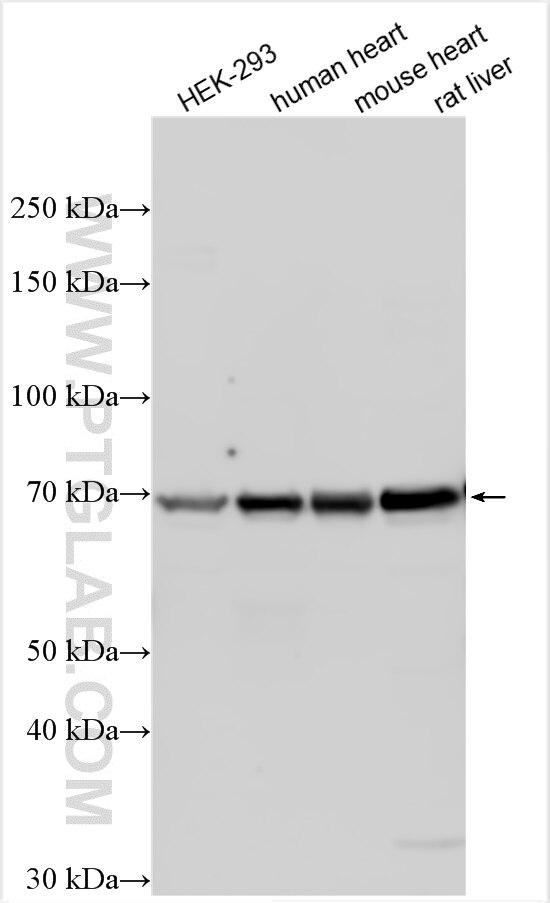Tested Applications
| Positive WB detected in | HEK-293 cells, human heart tissue, mouse heart tissue, rat liver tissue |
Recommended dilution
| Application | Dilution |
|---|---|
| Western Blot (WB) | WB : 1:500-1:3000 |
| It is recommended that this reagent should be titrated in each testing system to obtain optimal results. | |
| Sample-dependent, Check data in validation data gallery. | |
Product Information
31626-1-AP targets OATP1A2 in WB, ELISA applications and shows reactivity with human, mouse, rat samples.
| Tested Reactivity | human, mouse, rat |
| Host / Isotype | Rabbit / IgG |
| Class | Polyclonal |
| Type | Antibody |
| Immunogen | OATP1A2 fusion protein Ag34497 Predict reactive species |
| Full Name | solute carrier organic anion transporter family, member 1A2 |
| Calculated Molecular Weight | 670 aa, 74 kDa |
| Observed Molecular Weight | 70 kDa |
| GenBank Accession Number | NM_021094 |
| Gene Symbol | SLCO1A2 |
| Gene ID (NCBI) | 6579 |
| RRID | AB_3670054 |
| Conjugate | Unconjugated |
| Form | Liquid |
| Purification Method | Antigen affinity Purification |
| UNIPROT ID | P46721 |
| Storage Buffer | PBS with 0.02% sodium azide and 50% glycerol, pH 7.3. |
| Storage Conditions | Store at -20°C. Stable for one year after shipment. Aliquoting is unnecessary for -20oC storage. 20ul sizes contain 0.1% BSA. |
Background Information
SLCO1A2 also known as OATP1A2, is a member of the SLC21A family of solute carriers. SLCO1A2 encodes a sodium-independent transporter that mediates cellular uptake of organic ions in the liver(PMID: 19129463). It has been reported that SLCO1A2 detected a nonglycosylated form around 59kDa and 70-75 kDa glycosylated form(PMID: 15632119).
Protocols
| Product Specific Protocols | |
|---|---|
| WB protocol for OATP1A2 antibody 31626-1-AP | Download protocol |
| Standard Protocols | |
|---|---|
| Click here to view our Standard Protocols |



